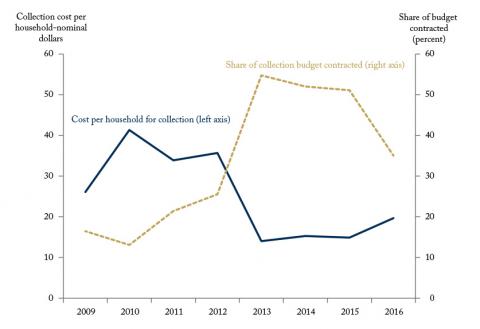From: Benjamin Dachis and Jacob Kim
To: Toronto City Council
Date: April 9, 2018
Re: How Contracting Waste Services can Lower Costs and Improve Performance
After an unsuccessful push in early 2017 to put garbage collection out to contract in parts of eastern Toronto, it’s time to bring the idea back to the table. That is because there are clear cost savings to be had.
A previous C.D. Howe Institute study showed that, on average, Ontario municipalities that have fully contracted their waste collection services save 24 percent per household relative to municipalities that don’t use contracts. The key is to maintain a competitive environment, inducing service providers to cut costs through innovation while reducing the risk of bearing costs from strikes or monopolistic behaviour.
A competitive bidding process derives cost savings by awarding contracts to those – whether private companies or in-house staff – that can demonstrate they can provide services at the lowest cost. Toronto’s contract with a private provider in 2011 to collect waste west of Yonge Street is a good example of this. Toronto estimates that it has seen annual savings of $11.1 million from this contract. Moreover, a well-designed contract that holds the contractor accountable for its performance ensures that the savings are not coming at the cost of service quality.
In 2009, less than 20 percent of Toronto’s waste collection spending was on contracted services. By 2014 and 2015, more than half of total spending was on contracted services. During that time, Toronto saw a remarkable reduction in waste collection costs per household. Between 2012 and 2013, following the 2011 contract, Toronto experienced an approximately 50 percent per household waste collection cost reduction (see figure).
The story of savings from municipal waste contracting applies to more than only Toronto. We updated the C.D. Howe Institute’s 2010 study using the Ontario Financial Information Return (FIR) data from 2009 to 2016 using an identical methodology. Across 368 Ontario municipalities, we find that municipalities with completely contracted-out waste services have, on average, 31 percent lower costs per household compared to municipalities without such contracts.
Dissecting further by service types, we find that the largest cost reduction comes from waste collection, in which there is an average of 39 percent lower costs per household for municipalities with full contracting. There is a moderate savings of 15 percent in fully contracted waste disposal services. For recycling, however, municipalities with full contracting face higher costs per household, at an average of 11 percent. The evidence makes a strong case for contracting out waste collection and disposal services, where there are a lot of potential savings.
It is time that Toronto City Council returns to the debate on how Toronto picks up household waste with a view to collecting some savings for Toronto taxpayers.
Benjamin Dachis is Associate Director of Research and Jacob Kim is a Researcher at the C.D. Howe Institute.






